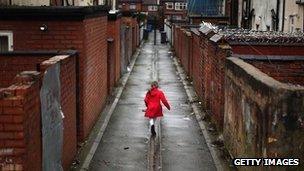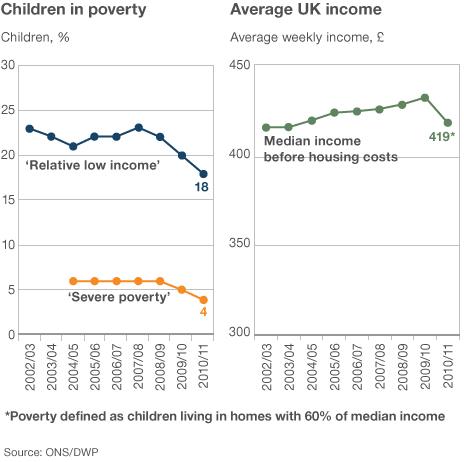Child poverty: Definition could include family breakdown
- Published
- comments
Iain Duncan Smith: "Understanding the nature of family life - debt, addiction, abuse - gives a better picture of whether a child is likely to be living in poverty"
Family breakdown, drug addiction, debt and education results are among the factors that could be used to measure child poverty in future, ministers say.
Recent figures showed fewer children in poverty - but largely because falling wages have narrowed the gap between the poorest and average earners.
Work and Pensions Secretary Iain Duncan Smith says this income-based method of measuring poverty is too simple.
He is launching a consultation on how to include other factors.
But Labour suggested that the government was trying to "distract attention" from "rather bleak" trends in child poverty data.
'Sky-high' poverty
"The Institute for Fiscal Studies says that child poverty is going to rise by 400,000 over the course of this Parliament, and it's a result of the government's policies," shadow employment minister Stephen Timms told the BBC News channel.
"Under the last government, we saw a big reduction of over a million in the number of children below the poverty line - that number is now going up," Mr Timms added.
Criticising the decision to freeze child benefit, the Labour MP warned that by 2020 the UK would be "back at the really sky-high levels of child poverty" that marred the mid-1990s unless the government changed tack.
A child is considered to be living in poverty if their household income is less than 60% of averages wages.
Last year that figure equated to £251 per week, which meant 2.3 million children were living in poverty.
That was 300,000 fewer children than the year before - but the reduction was due to average incomes falling rather than poorer families becoming better off.
Mr Duncan Smith says life is unchanged for these children and a broader definition of child poverty is needed.
This would be one that looks at joblessness, educational failure and family breakdown as well as income.

Child poverty is not just about financial circumstances, ministers say
In a speech at Clyde Children's Centre in South-East London, Mr Duncan Smith said: "Across the UK, there are children living in circumstances that simply cannot be captured by assessing whether their household has more or less than 60% of the average income.
"There are many factors that impact on a child's wellbeing and ability to succeed in life... and measuring income alone does little to represent the experience of those in poverty.
"As we saw earlier this year - when the child poverty level dropped by 2% - a fall in the median income may lift a family out of poverty on paper.
"Yet at a closer look, real incomes did not rise and absolute poverty was unchanged. For the 300,000 children no longer in poverty according to the official statistics, life was no different."
Held to account
But Chris Wellings, from Save the Children, said any new method of assessing child poverty must not be too broad to gauge progress or lack of it on the problem.
"The previous measure was very sharp, it allowed us to hold the government to account," he said.
"Any new measure needs to retain income and needs to retain an ability for us to really hold the government to account for their action on child poverty."
The Child Poverty Action Group said almost two-thirds of children living in poverty were in households where someone was in employment.
Building more affordable homes and reducing childcare costs were the keys to reducing child poverty, the charity added.

- Published9 September 2012
- Published14 June 2012
- Published14 June 2012
- Published21 May 2012